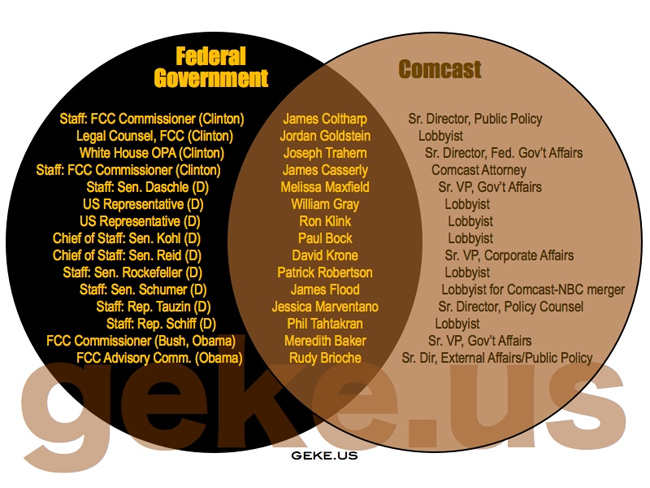By
on
One of the reasons community broadband networks face so many unique hurdles (often created deliberately by states in response to cable/dsl lobbying) is because of the many ways in which campaign finance corrupts our national and state governments.
Community broadband networks are focused on meeting community needs, not sending lobbyist armies into Washington, DC, and state capitals (though one of things we do at the Institute for Local Self-Reliance is offer help to those that do push pro-community agendas in these areas).
To understand why DC is so focused on furthering the corporate agendas of AT&T, Comcast, Time Warner Cable, and others, is to understand the revolving door. (Also, understanding capture -- which we have explained previously.)
In short, many of the people who make decisions about telecommunications policy in DC have worked, will work, or are presently working for the massive companies that effectively control access to the Internet in most of America's communities.
The good folks at Geke.US have created the following Comcast Venn Diagram illustrating a small piece of the DC revolving door.
 Reforming this system is a deep, seemingly intractable problem. But for those looking for answers, a good place to start is with the work of Lawrence Lessig. I just finished his Republic, Lost, which offers a grand tour of the problems resulting from the present system of campaign finance.
You can also see a number of his presentations here.
His organization, the Rootstrikers aim to get to the root of problems rather than being distracted by trying to fix symptoms of deeper problems. This is precisely what we do with our focus on community networks.
Many focus solely on resolving digital divide issues, improving rural access to the Internet, lowering the cost of broadband, or the various other problems that result from narrowly-focused private corporations owning and controlling essential communications infrastructure with inadequate regulations.
Solving the problem of ensuring all Americans have fast, affordable, and reliable access to the Internet (a goal remarkably consistant with the FCC's supposed mission enshrined in law by the Communications Act), would be remarkably easier in a world where Congress and state legislators were not corrupted by the influence of the campaign finance system. This is why we emphatically support efforts (like those of Lessig) to reform that system.
Reforming this system is a deep, seemingly intractable problem. But for those looking for answers, a good place to start is with the work of Lawrence Lessig. I just finished his Republic, Lost, which offers a grand tour of the problems resulting from the present system of campaign finance.
You can also see a number of his presentations here.
His organization, the Rootstrikers aim to get to the root of problems rather than being distracted by trying to fix symptoms of deeper problems. This is precisely what we do with our focus on community networks.
Many focus solely on resolving digital divide issues, improving rural access to the Internet, lowering the cost of broadband, or the various other problems that result from narrowly-focused private corporations owning and controlling essential communications infrastructure with inadequate regulations.
Solving the problem of ensuring all Americans have fast, affordable, and reliable access to the Internet (a goal remarkably consistant with the FCC's supposed mission enshrined in law by the Communications Act), would be remarkably easier in a world where Congress and state legislators were not corrupted by the influence of the campaign finance system. This is why we emphatically support efforts (like those of Lessig) to reform that system.
 Reforming this system is a deep, seemingly intractable problem. But for those looking for answers, a good place to start is with the work of Lawrence Lessig. I just finished his Republic, Lost, which offers a grand tour of the problems resulting from the present system of campaign finance.
You can also see a number of his presentations here.
His organization, the Rootstrikers aim to get to the root of problems rather than being distracted by trying to fix symptoms of deeper problems. This is precisely what we do with our focus on community networks.
Many focus solely on resolving digital divide issues, improving rural access to the Internet, lowering the cost of broadband, or the various other problems that result from narrowly-focused private corporations owning and controlling essential communications infrastructure with inadequate regulations.
Solving the problem of ensuring all Americans have fast, affordable, and reliable access to the Internet (a goal remarkably consistant with the FCC's supposed mission enshrined in law by the Communications Act), would be remarkably easier in a world where Congress and state legislators were not corrupted by the influence of the campaign finance system. This is why we emphatically support efforts (like those of Lessig) to reform that system.
Reforming this system is a deep, seemingly intractable problem. But for those looking for answers, a good place to start is with the work of Lawrence Lessig. I just finished his Republic, Lost, which offers a grand tour of the problems resulting from the present system of campaign finance.
You can also see a number of his presentations here.
His organization, the Rootstrikers aim to get to the root of problems rather than being distracted by trying to fix symptoms of deeper problems. This is precisely what we do with our focus on community networks.
Many focus solely on resolving digital divide issues, improving rural access to the Internet, lowering the cost of broadband, or the various other problems that result from narrowly-focused private corporations owning and controlling essential communications infrastructure with inadequate regulations.
Solving the problem of ensuring all Americans have fast, affordable, and reliable access to the Internet (a goal remarkably consistant with the FCC's supposed mission enshrined in law by the Communications Act), would be remarkably easier in a world where Congress and state legislators were not corrupted by the influence of the campaign finance system. This is why we emphatically support efforts (like those of Lessig) to reform that system. 






